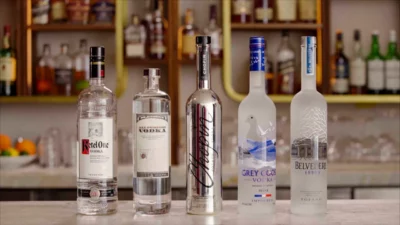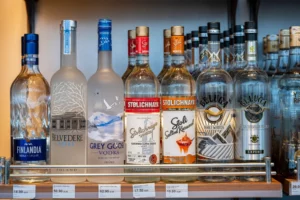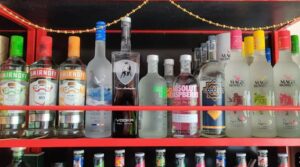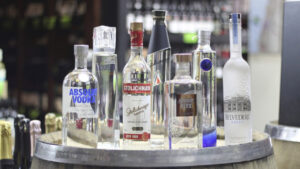In the world of spirits, vodka is renowned for its versatility, serving as the foundation for countless cocktails and a symbol of celebration. However, imagine the perplexity when you reach for your trusty bottle of vodka, only to discover it has inexplicably turned into a frosty, solid mass. “Why did my vodka freeze?”
This unexpected occurrence may leave you scratching your head and seeking answers. In this article, we delve into the scientific and environmental factors that can transform your once-liquid libation into an icy enigma, unraveling the mystery behind the chilling transformation of your favorite spirit.
Why did my vodka freeze in the freezer?
Vodka typically contains a high percentage of alcohol, which has a lower freezing point than water. The freezing point of alcohol is around -114 degrees Celsius (-173 degrees Fahrenheit), whereas the freezing point of water is 0 degrees Celsius (32 degrees Fahrenheit).
As a result, vodka should not freeze in a standard household freezer, which is typically set to temperatures well above the freezing point of alcohol.
There are a few reasons why your vodka might have frozen in the freezer:
- Temperature Setting: Make sure your freezer is set to the appropriate temperature. If the freezer is set to an extremely low temperature, it can cause the vodka to freeze.
- Alcohol Content: The alcohol content of vodka can vary, but it is usually around 40% alcohol by volume (80 proof) or higher. If your vodka has a lower alcohol content, it may be more prone to freezing.
- Impurities: Some impurities or additives in the vodka can affect its freezing point. High-quality, pure vodka should not freeze in a standard freezer, but lower-quality or flavored vodkas may have different properties.
- Freezer Malfunction: If your freezer is malfunctioning and not maintaining a consistent temperature, it may cause unexpected freezing of liquids.
To prevent your vodka from freezing in the future, ensure that your freezer is set to the correct temperature (typically around -18 degrees Celsius or 0 degrees Fahrenheit) and that your vodka is of standard alcohol content. If you suspect your freezer is not functioning properly, it may be a good idea to have it checked or calibrated by a technician.
Does vodka quality affect freezing?
Yes, the quality of vodka can affect its freezing point, but the difference is generally minimal. Vodka is primarily composed of water and ethanol (alcohol), and the freezing point of a solution depends on the concentration of those components.
Pure ethanol has a freezing point of approximately -114 degrees Celsius (-173 degrees Fahrenheit), while pure water freezes at 0 degrees Celsius (32 degrees Fahrenheit). Vodka typically contains a mixture of these two components, with varying levels of alcohol content.
Higher-quality vodkas often undergo more rigorous distillation and filtration processes, which can result in a purer product with fewer impurities. As a result, premium vodkas may have a slightly lower freezing point than lower-quality vodkas because they contain a higher percentage of ethanol and fewer impurities that could interfere with freezing.
However, the difference in freezing points between various vodka brands is generally not significant for practical purposes. In most home freezers, all types of vodka, regardless of quality, will freeze at temperatures well below the typical freezer temperature, which is around -18 degrees Celsius (0 degrees Fahrenheit).
Therefore, whether you have a high-quality vodka or a lower-quality one, it will still freeze if left in a typical home freezer for an extended period.
How does alcohol content impact freezing?
The freezing point of a liquid, including alcoholic beverages like vodka, is influenced by the concentration of alcohol (ethanol) in the mixture. Pure ethanol freezes at approximately -114 degrees Celsius (-173 degrees Fahrenheit), while pure water freezes at 0 degrees Celsius (32 degrees Fahrenheit).
When you mix alcohol and water, as is the case with most alcoholic beverages, the freezing point of the mixture falls between these two extremes.
Here’s how the alcohol content impacts the freezing point of a solution:
- Higher Alcohol Content: As the alcohol content in a solution increases, the freezing point decreases. In other words, a higher alcohol concentration lowers the temperature at which the liquid will freeze. This is why you can put a bottle of vodka in a typical home freezer, which is usually set at around -18 degrees Celsius (0 degrees Fahrenheit), and it will remain liquid.
- Lower Alcohol Content: Conversely, when the alcohol content in a solution decreases, the freezing point increases, meaning the liquid is more likely to freeze at higher temperatures. This is why wine, beer, and other lower-alcohol beverages can freeze at temperatures closer to 0 degrees Celsius (32 degrees Fahrenheit).
So, the alcohol content has a significant impact on the freezing point of a liquid. The more alcohol a solution contains, the lower its freezing point becomes, making it less likely to freeze at typical freezer temperatures.
However, it’s important to note that even high-proof spirits like vodka can eventually freeze at extremely low temperatures, such as those found in laboratory-grade freezers or in extremely cold outdoor conditions.
Can freezer temperature cause vodka to freeze?
Yes, freezer temperatures can cause vodka to freeze, but it typically requires temperatures significantly lower than those found in a typical home freezer. A standard household freezer is usually set to maintain a temperature of around -18 degrees Celsius (0 degrees Fahrenheit). At this temperature, the alcohol content in vodka is typically not high enough to freeze, and the vodka will remain in liquid form.
However, if you were to expose vodka to much colder temperatures, such as those found in a laboratory-grade freezer or in extremely frigid outdoor conditions, it is possible for vodka to freeze.
The freezing point of pure ethanol (the primary alcohol in vodka) is approximately -114 degrees Celsius (-173 degrees Fahrenheit), so if the surrounding environment reaches or falls below this temperature, the vodka will freeze.
In everyday scenarios and standard home freezers, vodka is unlikely to freeze, but extreme cold can indeed cause it to solidify.
Does vodka brand influence freezing?
The brand of vodka typically does not significantly influence its freezing point. Vodka is primarily composed of water and ethanol (alcohol), and the freezing point of a solution depends on the concentration of these components, not the brand of vodka.
The freezing point of vodka will be primarily determined by its alcohol content. The higher the alcohol content, the lower the freezing point. However, all commercially available vodkas are required to meet certain regulatory standards for alcohol content, typically around 40% alcohol by volume (80 proof). Therefore, most vodka brands have a similar alcohol content, and their freezing points will be in a similar range.
While there may be slight variations in the freezing point due to minor differences in the distillation and filtration processes used by different vodka brands, these differences are generally not significant for practical purposes.
In most home freezers, all brands of vodka, regardless of their specific brand or quality, will remain in liquid form because the freezer temperature is well below the freezing point of typical vodka.
Does water content affect vodka’s freeze point?
Yes, the water content in vodka does affect its freeze point. Vodka is a mixture of water and ethanol (alcohol), and the freezing point of a solution is lower than that of its individual components. This phenomenon is known as freezing point depression.
Pure ethanol freezes at approximately -114 degrees Celsius (-173 degrees Fahrenheit), while pure water freezes at 0 degrees Celsius (32 degrees Fahrenheit). When you mix these two substances to make vodka, the freezing point of the resulting solution falls somewhere in between, depending on the ratio of water to ethanol.
The more water there is in vodka, the closer its freezing point will be to 0 degrees Celsius (32 degrees Fahrenheit). Conversely, if the vodka has a higher ethanol content and less water, its freezing point will be lower but still above the freezing point of pure ethanol.
In practical terms, typical vodka has a water content of about 40-50%, which means it will have a freezing point slightly below 0 degrees Celsius (32 degrees Fahrenheit). This is why vodka can be stored in a freezer without freezing solid, but it may become thicker and more viscous at colder temperatures due to the increased concentration of ethanol.
Tips to prevent vodka from freezing
Preventing vodka from freezing is important if you want to store it in a freezer for a chilled drink without turning it into a solid block of ice. Here are some tips to help you prevent vodka from freezing:
- Choose vodka with a higher alcohol content: Vodka typically ranges from 35% to 50% alcohol by volume (ABV). The higher the alcohol content, the lower the freezing point. So, opt for vodka with a higher ABV if you plan to store it in the freezer.
- Keep the vodka sealed: Make sure the bottle is tightly sealed to prevent any air from entering. When air comes into contact with the vodka, it can promote freezing at a slightly higher temperature.
- Store it in the coldest part of the freezer: Place your vodka bottle in the coldest section of your freezer, usually near the back or on the bottom shelf. This is where the temperature is the most consistent and remains below the freezing point of vodka.
- Store it upright: Storing the vodka bottle upright helps ensure that the liquid inside the bottle remains evenly distributed. If the vodka is stored on its side, it might come into contact with the freezer’s surface and freeze more easily.
- Use a freezer with a lower temperature setting: If your freezer has adjustable temperature settings, set it to a lower temperature to maintain a consistently colder environment. Be cautious not to make the freezer too cold, as this could affect the quality of other frozen foods.
- Limit the time in the freezer: Avoid leaving the vodka in the freezer for an extended period, especially if you’re not planning to consume it quickly. The longer it stays in the freezer, the more likely it is to freeze over time.
- Consider vodka-specific freezer units: Some high-end home bar setups have specialized freezer units designed to store vodka and other spirits at the optimal temperature without freezing them. If you’re a serious vodka enthusiast, this might be an option to explore.
By following these tips, you can enjoy perfectly chilled vodka without the risk of it freezing solid in your freezer.
How does alcohol purity impact freezing?
The purity of alcohol, typically measured by its alcohol by volume (ABV) percentage, has a significant impact on its freezing point. Alcohol purity is essentially the concentration of ethanol (alcohol) in a liquid. Here’s how alcohol purity affects freezing:
- Higher Alcohol Purity Lowers the Freezing Point: Pure ethanol, which is 100% alcohol, freezes at around -114 degrees Celsius (-173 degrees Fahrenheit). As the purity of alcohol increases, the freezing point of the liquid decreases. So, the higher the ABV, the lower the freezing point. This is because the molecules of ethanol disrupt the formation of ice crystals, making it harder for the liquid to freeze.
- Alcohol-Water Mixture Freezing Points: When you have a mixture of alcohol and water, such as in alcoholic beverages like vodka or whiskey, the freezing point depends on the ratio of alcohol to water. For instance, typical vodka has an ABV of around 40-50%, which means it will have a freezing point slightly below 0 degrees Celsius (32 degrees Fahrenheit). The more alcohol (higher ABV) in the mixture, the lower the freezing point will be.
- Impurities and Additives: Some alcoholic beverages may contain impurities or additives that can affect the freezing point. For example, liqueurs often have added sugars or flavorings that can raise the freezing point slightly.
Conclusion
There are may theories about vodka and one common question people ask is why did my vodka freeze and here we have all the answers that you need. Your vodka froze because it contains a significant amount of water, which raises its freezing point compared to pure alcohol.
Vodka typically has an alcohol by volume (ABV) of about 40-50%, which means it will freeze at a slightly lower temperature than 0 degrees Celsius (32 degrees Fahrenheit). To prevent vodka from freezing, consider storing it in the coldest part of the freezer, keeping it sealed, and choosing vodka with a higher ABV if you plan to store it in the freezer for an extended period.




